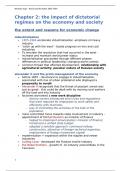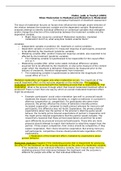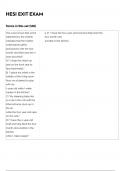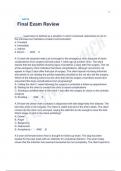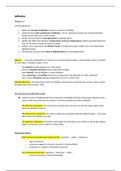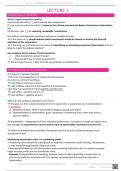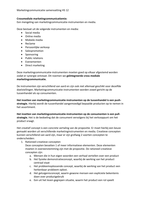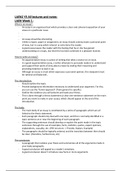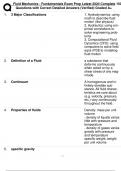Dementia
Crystallized intelligence: skills, abilities and knowledge that are overlearned, well-practiced
and familiar, like speaking a language or general knowledge about your country for example.
remains stable with normal aging.
Fluid intelligence: abilities involving problem solving skills and reasoning, like processing
speed or executive functioning like planning.
declines with normal aging.
Remain stable with aging
- non-declarative memory: implicit, unconscious knowledge like
procedural memory: remembering how to perform things, like how to ride a bike.
- retrieval/recognition memory: retrieving information when given a cue.
- temporal order memory: memory for the correct time or sequence of past events.
Decline with normal aging
- prospective memory: remembering to perform intended actions in the future, like taking
your pills every morning.
- delayed free recall: spontaneous recall of information from memory without a cue.
- source memory: knowing the source of information you have learned (tv/book/friends).
- declarative memory: recollection of facts and life events, this is explicit and conscious.
episodic memory: your own autobiographical memory of life.
semantic memory: use of language, meaning of words.
As you get older the hippocampus becomes smaller and this causes deficits in your episodic
memory problems with remembering personal life events from the past. From 20 years
old, the grey matter in your brain already starts declining in volume. The entorhinal cortex
(relay centre between the hippocampus and association areas) declines in Alzheimer’s
patients, but not with normal aging.
Scaffolding theory of aging:
because some areas in the
brain shrink and become less
active, other parts in the brain
have increasing functional
activity to make up for the lost
activity, this compensatory
activity is especially present in
the frontal cortex.
, Alzheimer’s disease
Dementia: condition characterized with abnormal loss of cognitive functioning and
behaviour abilities which interfere with the patients daily life.
Risk factors for abnormal cognitive aging:
- female gender
- genetics
- age (after the age of 65, the risk of getting dementia doubles every 5 years)
- cardiovascular risk factors
- brain injury
- inactive lifestyle
3 stages of Alzheimer’s
1. syndrome diagnosis: whether or not the patient has dementia.
- at least two cognitive domains have dysfunctions
- big decline compared to previous normal daily functioning
2. specific diagnosis: what type of dementia it is and thus what the cause is.
- there is always a certain uncertainty when diagnosing dementia
- probable AD, probable AD with increased certainty, possible AD and evident AD
3. definite diagnosis: looking into the brain to find Alzheimer related neurological things.
- only real diagnosis with autopsy, currently the clinical diagnosis is made based on
patient history, clinical examination, neuroimaging and neuropsychological tests.
Vascular hypothesis: vascular problems in the blood vessels, like a decreased blood flow to
the brain, cause Alzheimer’s.
- not clear whether the vascular problems are the cause of Alzheimer’s or the effect of
Alzheimer’s.
Amyloid cascade hypothesis: amyloid plaques form
between nerve cells of the brain, also neurofibrillary
tangles form in nervous cells causing braincell death.
- lack of coherent evidence for this hypothesis.
- not clear whether these plaques cause Alzheimer’s or
if Alzheimer’s causes the plaques.
- no effective treatment yet based on this hypothesis.
Biomarker: a sign that can be used as an objective indication of medical state observed from
outside the patient, measured accurately and reproducibly.
- imaging biomarkers
- cerebrospinal fluid biomarkers
- blood biomarkers
Crystallized intelligence: skills, abilities and knowledge that are overlearned, well-practiced
and familiar, like speaking a language or general knowledge about your country for example.
remains stable with normal aging.
Fluid intelligence: abilities involving problem solving skills and reasoning, like processing
speed or executive functioning like planning.
declines with normal aging.
Remain stable with aging
- non-declarative memory: implicit, unconscious knowledge like
procedural memory: remembering how to perform things, like how to ride a bike.
- retrieval/recognition memory: retrieving information when given a cue.
- temporal order memory: memory for the correct time or sequence of past events.
Decline with normal aging
- prospective memory: remembering to perform intended actions in the future, like taking
your pills every morning.
- delayed free recall: spontaneous recall of information from memory without a cue.
- source memory: knowing the source of information you have learned (tv/book/friends).
- declarative memory: recollection of facts and life events, this is explicit and conscious.
episodic memory: your own autobiographical memory of life.
semantic memory: use of language, meaning of words.
As you get older the hippocampus becomes smaller and this causes deficits in your episodic
memory problems with remembering personal life events from the past. From 20 years
old, the grey matter in your brain already starts declining in volume. The entorhinal cortex
(relay centre between the hippocampus and association areas) declines in Alzheimer’s
patients, but not with normal aging.
Scaffolding theory of aging:
because some areas in the
brain shrink and become less
active, other parts in the brain
have increasing functional
activity to make up for the lost
activity, this compensatory
activity is especially present in
the frontal cortex.
, Alzheimer’s disease
Dementia: condition characterized with abnormal loss of cognitive functioning and
behaviour abilities which interfere with the patients daily life.
Risk factors for abnormal cognitive aging:
- female gender
- genetics
- age (after the age of 65, the risk of getting dementia doubles every 5 years)
- cardiovascular risk factors
- brain injury
- inactive lifestyle
3 stages of Alzheimer’s
1. syndrome diagnosis: whether or not the patient has dementia.
- at least two cognitive domains have dysfunctions
- big decline compared to previous normal daily functioning
2. specific diagnosis: what type of dementia it is and thus what the cause is.
- there is always a certain uncertainty when diagnosing dementia
- probable AD, probable AD with increased certainty, possible AD and evident AD
3. definite diagnosis: looking into the brain to find Alzheimer related neurological things.
- only real diagnosis with autopsy, currently the clinical diagnosis is made based on
patient history, clinical examination, neuroimaging and neuropsychological tests.
Vascular hypothesis: vascular problems in the blood vessels, like a decreased blood flow to
the brain, cause Alzheimer’s.
- not clear whether the vascular problems are the cause of Alzheimer’s or the effect of
Alzheimer’s.
Amyloid cascade hypothesis: amyloid plaques form
between nerve cells of the brain, also neurofibrillary
tangles form in nervous cells causing braincell death.
- lack of coherent evidence for this hypothesis.
- not clear whether these plaques cause Alzheimer’s or
if Alzheimer’s causes the plaques.
- no effective treatment yet based on this hypothesis.
Biomarker: a sign that can be used as an objective indication of medical state observed from
outside the patient, measured accurately and reproducibly.
- imaging biomarkers
- cerebrospinal fluid biomarkers
- blood biomarkers


